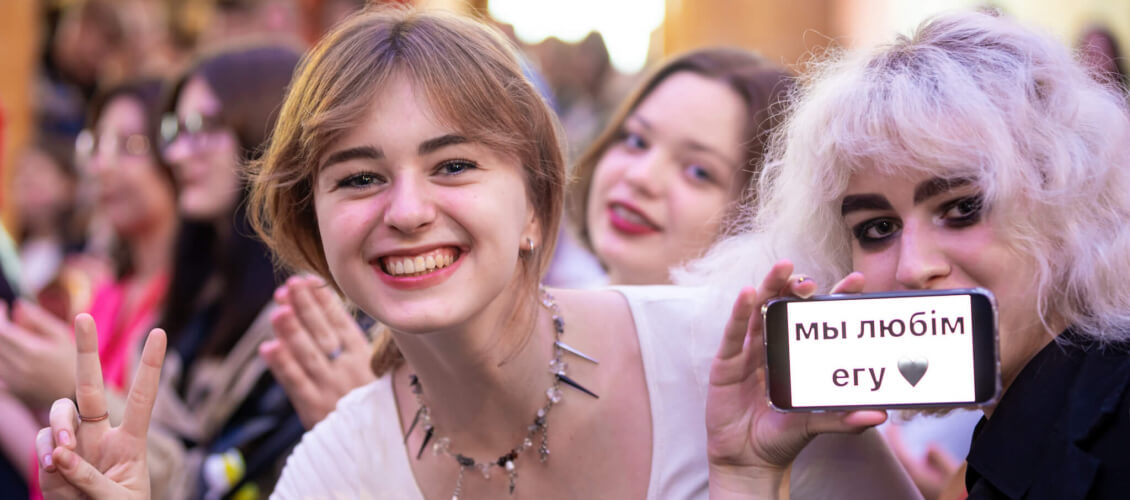As part of the admission campaign, which was announced on April 24, 2023, EHU introduced enrollment for 7 bachelor’s (full-time and part-time), 5 master’s (blended learning), and 1 Ph.D. programs, covering a wide range of social and humanitarian fields.
The main admission process concluded on July 10 with a total of over 800 submitted applications. High demand, which persisted after the main intake, led to the launch of an additional enrollment period from August 1 to August 20, during which approximately 170 more applications were received.
As a result of the admission campaign, 639 applicants from 11 countries were admitted to the first year: the majority of them were citizens of Belarus (79%). In addition, citizens of Azerbaijan, Estonia, Italy, Kazakhstan, Kyrgyzstan, Lebanon, Lithuania, Nigeria, Russia, and Ukraine joined the university community.
For the second consecutive year, EHU has demonstrated record growth in the number of students. In the university’s 30th-anniversary year in 2022, EHU admitted 631 new students.
Among the study programs that were most in demand this year were “Visual Design” – 94 students, “Media and Communication” – 144, and “Informatics” – 201.
The opening ceremony of the new academic year took place on October 2, 2023, in the Vilnius Town Hall.
The solemn event was attended by heads of diplomatic missions, distinguished guests, and friends of EHU.
EHU Rector Professor Krzysztof Rybinski addressed the academic community with welcoming remarks.
“We live in challenging times. We are witnessing Russia’s invasion of Ukraine. We are also witnessing the oppressive regime in Belarus depriving its people of basic human rights, such as free speech. We understand that we cannot change this situation today. What we can do is try to shape a better future. People like you, young individuals who are joining us today, can receive an education based on civil society values and democratic principles. Later on, you can contribute to creating a better future for yourselves and future generations. I’m proud to say that this is what we do here at the European Humanities University,” Mr Rybinski said.
After thanking the Republic of Lithuania for the academic shelter provided to the University by the government, the hosts invited Viktorija Čmilytė-Nielsen, Speaker of the Seimas, and Žygimantas Pavilionis, Member of the Seimas.
“This institution that has matured in Belarus, despite all the difficulties faced after its expulsion from Minsk, stands as a testament not only to the pursuit of knowledge but also to the cultivation of critical minds and open hearts. It embodies the resilience of intellect in the face of persecution and the commitment to the ideals of academic freedom,” Ms Čmilytė-Nielsen said.
Mr. Pavilionis shared his personal experience of seeing Soviet tanks during his student days and his aspiration for Lithuania to join the European Union and NATO. He expressed his hope that Belarus would achieve the same dream, emphasizing that Europe is shaped by the people who fight for it, and encouraged students to make it their personal mission.
Greetings to the audience were delivered by
- Viktoriya Kanstantsiuk, EHU Senate representative;
- Professor Ryhor Miniankou, Acting Head of the Academic Department of Social Sciences;
- Associate Professor Aliaksandr Marchanka, representative of the Academic Department of Humanities and Arts;
- Assoc. Prof. Dmitry Samal, Head of Informatics program (School of Digital Competencies);
- Iakov Grachev, President of the Students’ Union.
During the musical breaks, the famous Belarusian composer and jazzman Pavel Arakelian, accompanied by the band The Outsiders, performed piano compositions.
Following a cherished university tradition, there was a ceremonial cutting of the welcome cake, after the official part of the ceremony. This gesture symbolizes the commencement of an academic year filled with new knowledge, creative discoveries, and outstanding achievements.
Founded in 1992 in Minsk, the European Humanities University is today an international institution that transcends borders and embraces diversity. With over 1,500 students from 15 countries, EHU is more than just a university – it is a symbol of the unstoppable power of education, the enduring pursuit of democratic ideals, and the unwavering commitment to creating a better future for all.
